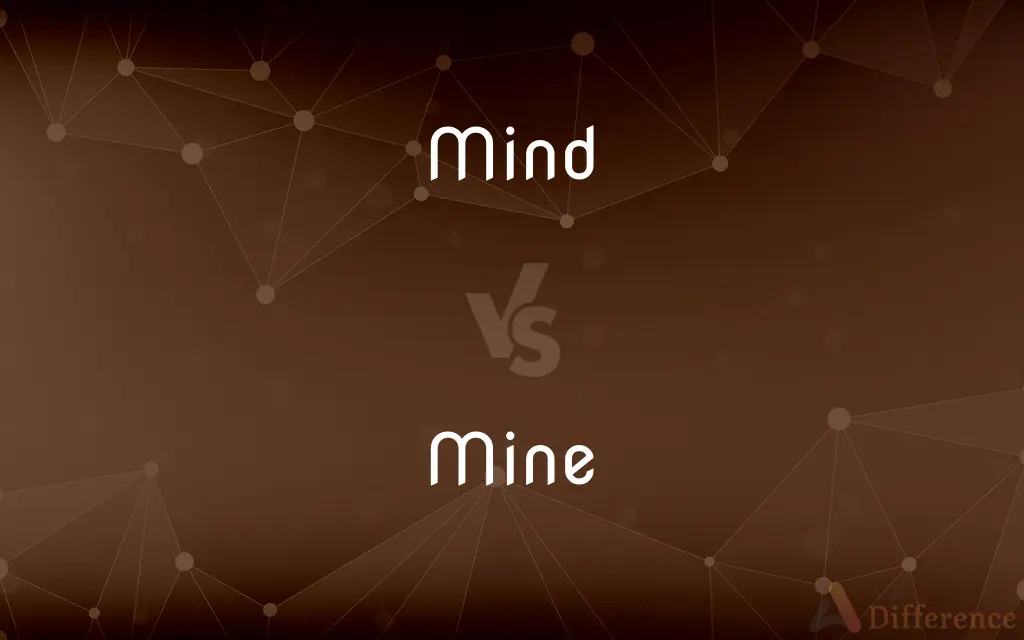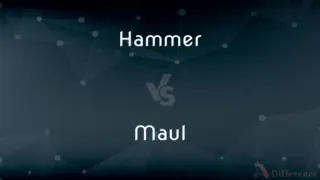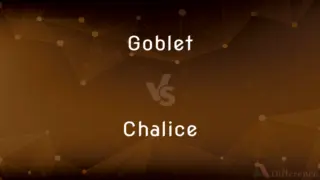Mind vs. Mine — What's the Difference?
By Tayyaba Rehman & Fiza Rafique — Updated on February 22, 2024
"Mind" refers to the faculty of consciousness, including thoughts, perceptions, and memories, while "mine" is a possessive pronoun indicating ownership or a noun referring to an excavation in the earth for extracting minerals.

Difference Between Mind and Mine
Table of Contents
ADVERTISEMENT
Key Differences
The term "mind" encompasses the aspects of intellectual and emotional faculties, signifying the collective consciousness that includes thoughts, feelings, memories, and the sense of self. It is central to cognitive processes, psychological understanding, and the subjective experience of being. In contrast, "mine" serves a dual role in language: as a possessive pronoun, it replaces "my" to denote possession or belonging (e.g., "That book is mine."); as a noun, it refers to a type of industrial operation where minerals, coal, or precious stones are extracted from the earth.
The distinction between "mind" and "mine" extends beyond their primary meanings to their functional roles in sentences and discourse. "Mind" often appears in contexts relating to mental activities, psychological states, or processes of thinking and feeling. Meanwhile, "mine" as a pronoun personalizes possession or relation to the speaker, and as a noun, it situates within discussions of geography, economics, and environmental studies.
"Mind" can also imply attention or care in certain idiomatic expressions (e.g., "Mind your manners"), indicating a directive towards consciousness or awareness of actions. The pronoun "mine" emphasizes a personal connection or ownership, which can be emotional, physical, or intellectual. As a noun, "mine" connects to a wide array of discussions on labor, resource management, and the environmental impact of resource extraction.
In terms of usage, "mind" is versatile, applying to various disciplines from psychology and philosophy to everyday expressions of concern and care. "Mine," however, delineates clear boundaries of possession and the physical spaces of resource extraction, reflecting its role in personal identification and industrial contexts.
"Mind" and "mine" share phonetic similarities, their meanings, applications, and implications diverge significantly, while highlighting the richness and complexity of language in conveying abstract concepts like consciousness and tangible matters like ownership and industrial activity.
ADVERTISEMENT
Comparison Chart
Definition
The faculty of consciousness, thought, and emotion.
Possessive pronoun indicating ownership or a place for mineral extraction.
Usage
Refers to cognitive processes and mental states.
Indicates possession or refers to an excavation site.
Contexts
Psychology, philosophy, everyday language.
Personal possession, industrial and economic discussions.
Function in Language
Describes mental activities or states of being.
Denotes ownership or identifies a specific type of location.
Examples
"I changed my mind." / "Peace of mind."
Pronoun: "That book is mine." / Noun: "They work in a coal mine."
Compare with Definitions
Mind
The center of thought and emotion.
He speaks his mind freely.
Mine
(Pronoun) Belonging to me.
Is that your coat? No, it’s mine.
Mind
The faculty of consciousness.
Meditation helps to clear my mind.
Mine
(Pronoun) Emphasizing personal connection.
My opinion may differ, but it’s mine.
Mind
To be bothered or concerned.
I don’t mind the rain.
Mine
(Noun) A place where minerals are extracted.
The old mine was closed due to safety concerns.
Mind
Attention or care.
Mind the gap when exiting the train.
Mine
(Pronoun) Used to express a relationship.
This dream is mine alone.
Mind
Intellectual capacity.
She has a brilliant mind.
Mine
(Noun) Can refer to explosive devices buried underground.
The area was scattered with unexploded mines.
Mind
(Philosophy) The phenomena of intelligence, cognition, or consciousness, regarded as a material or immaterial aspect of reality.
Mine
To dig a mine or pit in the earth; to get ore, metals, coal, or precious stones, out of the earth; to dig in the earth for minerals; to dig a passage or cavity under anything in order to overthrow it by explosives or otherwise.
Mind
The mind is the set of faculties responsible for mental phenomena. Often the term is also identified with the phenomena themselves.
Mine
Get from the earth by excavation.
Mine ores and metals.
Mind
The state, at any given time, of the faculties of thinking, willing, choosing, and the like; psychical activity or state.
A fool uttereth all his mind.
Being so hard to me that brought your mind, I fear she'll prove as hard to you in telling her mind.
Mine
A hole or tunnel dug into the earth from which ore or minerals are extracted.
Mind
Memory; remembrance; recollection; as, to have or keep in mind, to call to mind, to put in mind, etc.
Mine
To dig a mine in (the earth) to obtain ore or minerals.
Mine
My; belonging to me.
Common Curiosities
How is "mind" used in the phrase "mind your manners"?
It means to pay attention to or be careful about one’s behavior and actions.
Can "mine" be used for things other than physical objects?
Yes, "mine" as a pronoun can denote ownership of non-physical entities, such as ideas or emotions.
What are the environmental impacts of a "mine"?
Mining can lead to habitat destruction, water pollution, and air quality degradation, among other environmental concerns.
Is "mine" always possessive?
As a pronoun, "mine" is always possessive, indicating something belongs to the speaker. As a noun, it refers to an excavation site and is not possessive.
What does "have a mind to" mean?
It means being inclined or considering to do something, indicating a decision-making process.
What role does "mind" play in mental health?
The state of one’s mind is central to mental health, encompassing emotional, psychological, and social well-being.
What does "mind" refer to in psychology?
In psychology, "mind" refers to the collective cognitive faculties responsible for an individual's thoughts, perceptions, memories, and emotions.
What is the importance of "mindfulness"?
Mindfulness is the practice of being present and fully engaged with the current moment, enhancing mental well-being and reducing stress.
How does the concept of "mind" differ across cultures?
Perceptions of the mind can vary significantly, with some cultures emphasizing its interconnectedness with the body and the external world, while others view it more as a distinct entity responsible for rational thought.
How can "mine" be used to express personal feelings?
"Mine" articulates a sense of personal attachment or claim, as in "This victory is mine," highlighting emotional ownership.
How does one "change their mind"?
Changing one’s mind involves altering a previously held belief, decision, or opinion after reconsideration.
How does the concept of "mind" relate to consciousness?
The mind is often considered the aspect of intellect and consciousness experienced as combinations of thought, perception, memory, emotion, will, and imagination.
What legal considerations exist for operating a "mine"?
Legal considerations include environmental regulations, labor laws, safety standards, and land use rights, ensuring responsible mining practices.
Are there sustainable ways to operate a "mine"?
Yes, sustainable mining practices include reducing environmental impact, conserving resources, and ensuring community benefits.
Can "mine" refer to shared ownership?
Typically, "mine" emphasizes individual ownership, but contextually, it can include shared ownership if the speaker is part of a collective.
Share Your Discovery

Previous Comparison
Hammer vs. Maul
Next Comparison
Goblet vs. ChaliceAuthor Spotlight
Written by
Tayyaba RehmanTayyaba Rehman is a distinguished writer, currently serving as a primary contributor to askdifference.com. As a researcher in semantics and etymology, Tayyaba's passion for the complexity of languages and their distinctions has found a perfect home on the platform. Tayyaba delves into the intricacies of language, distinguishing between commonly confused words and phrases, thereby providing clarity for readers worldwide.
Co-written by
Fiza RafiqueFiza Rafique is a skilled content writer at AskDifference.com, where she meticulously refines and enhances written pieces. Drawing from her vast editorial expertise, Fiza ensures clarity, accuracy, and precision in every article. Passionate about language, she continually seeks to elevate the quality of content for readers worldwide.














































